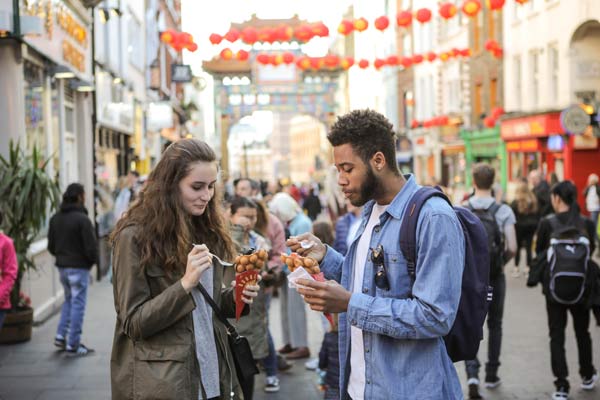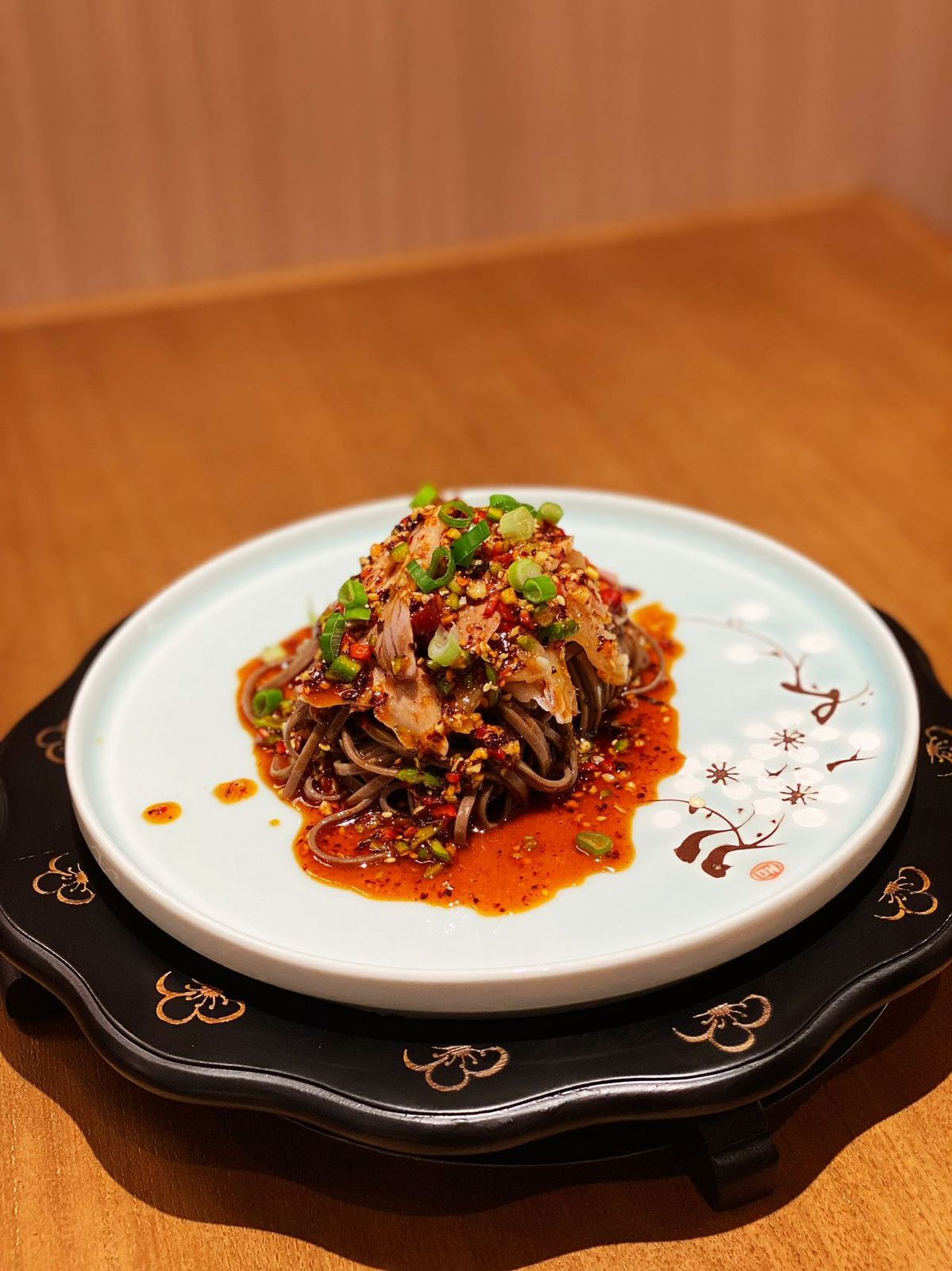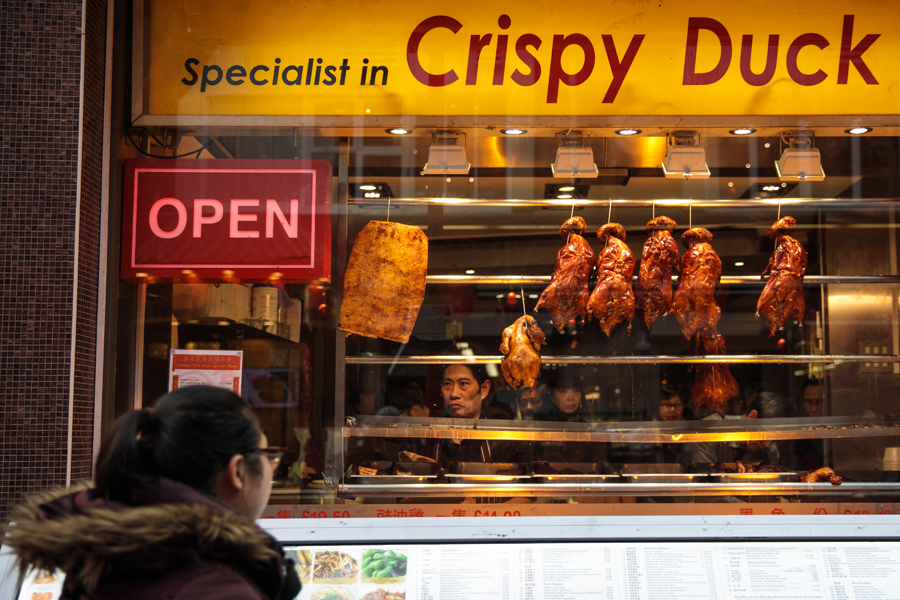
People enjoy bubblewrap waffles in London's iconic Chinatown.
London's Chinese food scene has expanded far beyond the Cantonese-centric offerings that once defined it, transforming into a vibrant tapestry of regional cuisines.
For decades, London's Chinatown was synonymous with dim sum parlors, roasted meats, and takeaways, catering to local British tastes with dishes rooted in Guangdong province.
While these classics laid the foundation of familiarity, the city's culinary identity has evolved, driven by the growing presence of people from the Chinese mainland, and Londoners' burgeoning appetite for authentic regional flavors.
Chen Xin, chairman of Gen C Lifestyle and the organizer of the 2024 London Chinese Cuisine International Development Convention, highlighted the shift, saying: "London's food scene has seen an influx not only of traditional Cantonese restaurants but also a diverse range of regional Chinese cuisines.
"Successful hot pot chain restaurants like Haidilao, Da Long Yi, and Xiao Long Kan have made their mark, while regional specialties from places like Chongqing, Hunan, and Northeast China are gaining popularity."
Chen attributed this shift to Londoners' growing curiosity about the rich culinary landscape of China.
Broader culinary landscape
Gordon Cheung, an expert in Chinese food studies at Durham University, described the transformation as unmistakable.
"The previous Chinatown has been upgraded and extended," he said, noting how food offerings have become both "specialized" and "diversified" and include regional cuisines as well as trendy additions like bubble tea and Chinese dessert cafes. Cheung noted the inclusion of Taiwanese restaurants, such as Leong's Legend, was further evidence of this expanding culinary landscape.
London now offers Chinese dining experiences for every occasion and budget. Michelin-starred venues like A Wong and Kai Mayfair redefine Chinese fine dining, while fusion-inspired restaurants like Hakkasan and Hutong blend traditional flavors with modern presentation. Casual options, such as noodle houses like JWD Lamian Noodle Bar, provide hearty northern Chinese staples like beef noodles in chili oil.
"The growing demand for diverse and authentic culinary experiences is reshaping London's Chinese food scene," Chen added.
Hotpot and noodle culture take center stage
Hotpot culture has captivated Londoners, with chains recreating the communal dining experiences beloved in Chengdu and Chongqing.
Noodle shops are also gaining traction, reflecting the city's growing appreciation for authentic, everyday Chinese food.
Karen Kwok, a London-based foodie originally from Hong Kong, has witnessed this evolution first-hand.
"When I came to London in 2015, most Chinese restaurants served Cantonese food, dim sum, and roast duck. While I love those, the options lacked variety," she said. "Over time, Sichuan restaurants gained popularity as people became obsessed with spicy food. Then, all of a sudden, there were hotpot restaurants everywhere, along with dumpling and noodle shops."
Having tried around 20 to 30 Chinese restaurants in the city, Kwok recommends A Wong for fine dining, Ma La Sichuan for casual meals, and Xiao Long Kan Hotpot in Holborn for hotpot enthusiasts.
The increasing variety of Chinese food in London is a development Kwok sees as overwhelmingly positive.
"Westerners' views of Chinese food are often one-dimensional," she said. "But the diversity of regional dishes – each with unique flavors – encourages cultural exchange and drives restaurants to improve."
She is particularly fond of dining at hotpot and noodle establishments, which have become increasingly popular in the city and describes hotpot as an "adventure" for many Londoners, likening it to Swiss fondue.
"It comes with so many ingredients unfamiliar to Westerners – like frog legs – which makes it an experience. Noodles and dumplings, on the other hand, are budget-friendly and beloved staples in a pricey city like London," she added.

A spicy meal from Jincheng Alley.
Regional flavors making waves
London's dining scene now showcases specialties from across China. Restaurants like Barshu and Jincheng Alley bring the numbing heat of Sichuan peppercorns and complex chili sauces to eager diners.
Luan Zhixin, owner of Jincheng Alley, explained her motivation.
"During the pandemic, many of us abroad longed for authentic flavors from home. We wanted to create a space where Chinese expats could enjoy genuine Sichuan cuisine and introduce locals to authentic Chinese flavors."
At Jincheng Alley, authenticity is key, she said.
"Our chilies, Sichuan peppercorns, and other seasonings are sourced directly from Sichuan," Luan emphasized. "This ensures a flavor profile that differs from locally available ingredients. Customers also appreciate the consistency in quality and the decor, which reflects the warmth and simplicity of small eateries in China."
Luan has witnessed first-hand how London's Chinese dining scene has evolved.
"The market has seen the entry of major Chinese dining brands offering hotpot, bubble tea, and spicy soup, creating more competition. When we opened in 2021, we relied on word-of-mouth recommendations, but now we focus on increasing visibility to stand out in this crowded space."
While some restaurants adapt to local tastes, Luan believes in maintaining authentic Sichuan flavors.
"Our chefs carefully select ingredients and seasonings to preserve the true essence of Sichuan cuisine. Competition from fusion restaurants motivates us to stay true to our mission: providing Chinese expats with a taste of home and showcasing the depth of Chinese culinary culture to locals."
Meanwhile, the flavors of Xi'an and Xinjiang are also making waves. Restaurants like Master Wei serve hearty hand-pulled noodles, while Xinjiang cuisine delights with cumin-spiced lamb skewers. These dishes offer diners both new flavors and deeper cultural experiences.

A passerby checks out the window of a popular Chinatown restaurant.
The road ahead for Chinese cuisine
Kevin Tang, chairman of the Chinese Catering Association of UK, praised the growing diversity of Chinese cuisine in London.
"This variety reflects broader acceptance of Chinese culinary culture and attracts more international customers," he said, noting the presence of 11 Michelin-starred Chinese restaurants in the city that mostly lean toward fusion flavors that meet local expectations.
Tang explained the challenges Chinese dining culture faces when evaluated by Michelin standards, which focus on individual dining experiences rather than the lively communal style that is traditional to Chinese meals.
"To succeed, restaurants must adapt to the system," he said.
As the market diversifies, Tang sees a growing trend toward smaller, more refined dining formats that allow Chinese cuisine to adapt to global markets. His own restaurant, Bright Courtyard Club, combines Cantonese and Shanghai flavors while focusing on quality and innovation.
"We continuously refine our menu by introducing new dishes and enhancing existing ones," Tang explained. "Additionally, we leverage social media to sustain visibility and actively participate in public events to boost our exposure and reputation."
Cheung from Durham University also emphasized the importance of advancing the industry through education, suggesting that London's Chinese culinary landscape could benefit from the establishment of serious, larger culinary schools dedicated to teaching authentic Chinese cooking, which would inspire greater appreciation and mastery of the cuisine.
Cheung also underscored the need for improved shopping experiences at Chinese supermarkets.
"While these supermarkets are popular, modernization and a more welcoming atmosphere are needed," he said. He proposed the introduction of premium Chinese supermarket chains, such as Pangdonglai, to elevate the shopping experience for Londoners and residents of other major UK cities.
The evolving Chinese food scene in London represents more than just culinary innovation – it reflects a broader cultural shift, offering diners deeper insights into China's rich culinary traditions and fostering opportunities for cultural exchange. With its diverse and dynamic offerings, London is becoming a true global hub for Chinese cuisine.
Wangmingjie@mail.chinadailyuk.com